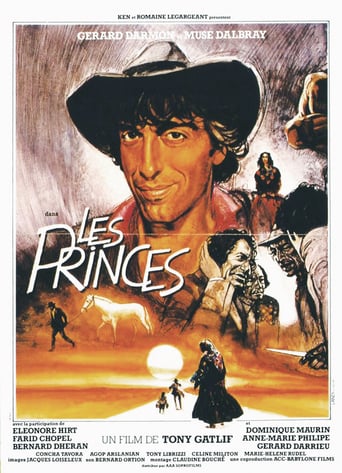



Slow pace in the most part of the movie.
People are voting emotionally.
Intense, gripping, stylish and poignant
This is one of the best movies I’ve seen in a very long time. You have to go and see this on the big screen.
View MoreLes princes is the debut movie of the director of succesful gypsy movies such as gadjo dilo and vengo, which focus mostly on music. Les princes paints a portrait of a father, daughter and grandmother living in an almost abandoned and decaying outskirt of paris, where, surprisingly enough, the gendarmes still find it necessary to bother people and house owners still dare to evict people living in these dumps. The tone is desperate at times, showing the immense inequality and racism gypsies are faced with, but it also exposes subtly the incompatibilities and inability of the two sides to understand and respect each other more. That made this movie on gypsy life stand out, neither romanticising nor revealing anything. Inevitably in a movie on gypsies, there was lots of humor as well, showing how stupidity and ignorance can prevail among the gadje, but also making fun and affirming stereotypes on gypsies, like their renowned talent for stealing. All this still left enough space for the nostalgia and tragedy that are also entangled in gypsy music and legends.
View MoreWhen I came to look up "Les Princes" on this database it was something of a surprise that there were no user comments or external reviews of a film I would regard as particularly worthy of attention. By comparison two of Tony Gatlif's other gypsy films, "Lacho Drom" and "Gadjo Dilo", worthy but lesser works in my opinion, would appear to have been "discovered". The earlier "Les Princes" is a savage and angry work about a proud people trying to survive in a world that regards them as human scum, fit only to exist in squalid council apartment blocks - and there only under the continual threat of eviction - after which there is only the open road or a space set aside by the municipal rubbish tip. Nara, the central character, is hardly a sympathetic type. He has a harsh temperament that is often given to violence. Yet, for all the scrapes he gets into and a failed family life - a little girl whom he adores by a trollop he detests and an elderly mother with whom he is always bickering - he carries his head high - a match for all those he comes up against, particularly a patronising woman journalist who seeks an interview with him. One of the most remarkable features of "Les Princes" is its use of carefully chosen locations to underline the squalid conditions these unaccepted people have to exist in. It was shot in and around the town of Guise in the north-east, a part of France that tourists possible never visit apart from passing through. The first half of the film is played out in urban landscapes, the housing apartments where even the window frames are good for flogging, a seedy bar ironically named "Bar des Princes" and a derelict factory. It is a crazy and cluttered world mirrored in a slightly confused narrative. It is only when the family is evicted and take to the open road, with Nara's mother - a marvellous study of female stubbornness and resilience - determined to find a lawyer that will put things right, that the film achieves a clear narrative flow that at times touches on greatness. It becomes the mother's film at this point, her odyssey leading the others onward through a landscape buffeted by rain. The happenings of the last half-hour are truly remarkable.
View More